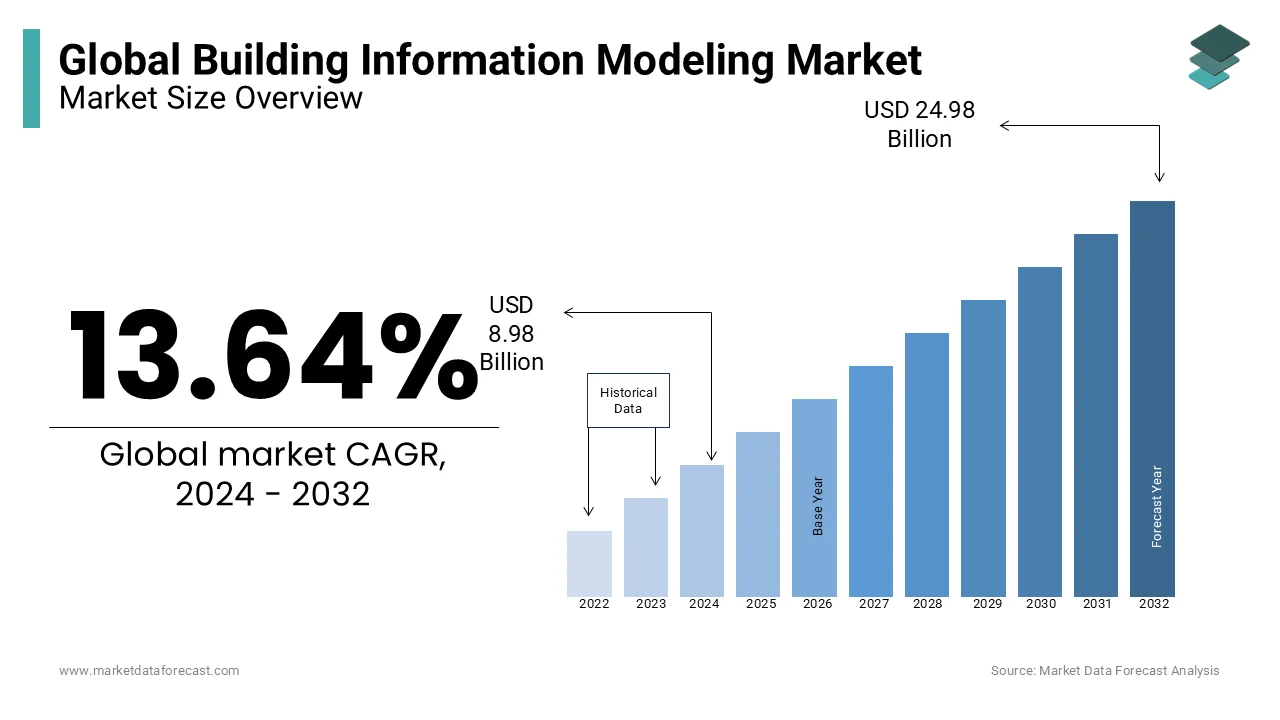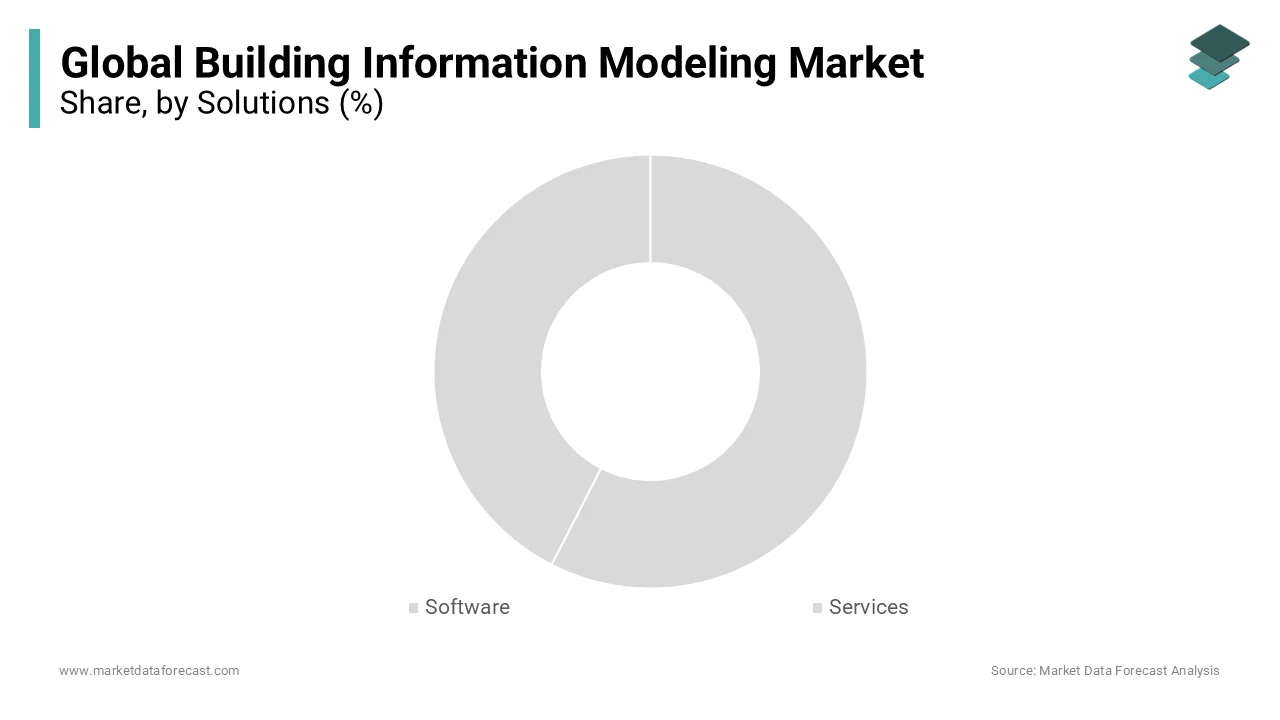Global Building Information Modeling Market Size, Share, Trends, Growth Forecast Report – Segmented by Solution (Software & Services), End-Users (Architects, Contractors, Engineers and Others) & Region - Industry Forecast From 2024 to 2032
Global Building Information Modeling Market Size (2024 to 2032)
The global building information modelling market was worth USD 7.90 billion in 2023. The global market is expected at USD 8.98 billion in 2024 and is estimated to reach a valuation of USD 24.98 billion by the end of 2032, expanding at a CAGR of around 13.64%.

Building Information Modelling (BIM) is a creative process based on 3D models that provide architecture, engineering and construction (AEC) professionals with information and tools to plan, design, configure and manage buildings and infrastructure more efficiently. BIM is used to design and document buildings and infrastructure designs. All the details of the building are modelled with BIM. We can use this analysis model to explore design options and create visualizations to help stakeholders understand how they will look before construction.
MARKET DRIVERS
As the population overgrew, demand from the residential sector increased as several governments around the world offered incentives for growth in this sector.
An essential driver of the development of the building information modelling market is the rapid development of developmental activities worldwide. Government regulators are also taking steps to increase acceptance of construction information modelling in their countries and to strengthen the market. The acceptance of small businesses is driving the demand for building information modelling. Also, the technical improvements of some companies that design mobile applications to access their services will increase the growth of the building information modelling market in the near future. The creation of information models increases productivity, improves visualization, accelerates delivery and reduces costs. These factors will be sufficient for the future development of the building information modelling industry. In addition, several mergers and acquisitions by market participants are one of the main aspects responsible for the growth of this market.
MARKET RESTRAINTS
On the other hand, continuous software updates and expensive software are hampering the development of the building information modelling market. Less knowledge of software management can hinder the growth of the market.
REPORT COVERAGE
|
REPORT METRIC |
DETAILS |
|
Market Size Available |
2023 to 2032 |
|
Base Year |
2023 |
|
Forecast Period |
2024 to 2032 |
|
CAGR |
13.64% |
|
Segments Covered |
By Solution, End-Users, and Region |
|
Various Analyses Covered |
Global, Regional & Country Level Analysis, Segment-Level Analysis, DROC, PESTLE Analysis, Porter’s Five Forces Analysis, Competitive Landscape, Analyst Overview on Investment Opportunities |
|
Regions Covered |
North America, Europe, APAC, Latin America, Middle East & Africa |
|
Market Leaders Profiled |
ABM Europe, Autodesk Inc., Atkins Bentley System, Inc, Dassault Systems SA, Nemetschek AG, BIM Technologies, Deutsche Bahn, Siemens AG, AG Faithful Gould and Trimble Inc., Intergraph Aveva Asite Ltd., and others. |
SEGMENTAL ANALYSIS
Global Building Information Modelling Market Analysis By Solutions

The global BIM market is divided into services and software. The cloud-based software will be the most crucial aspect in the building information modeling market due to its easy access and profitability to local frameworks. The types of software dominated this sector due to its ability to provide greater efficiency and transparency in construction work.
Global Building Information Modelling Market Analysis By End-user
The building information modelling business is divided into engineers, contractors, architects and others. As the number of developmental programs increases, architects have become the dominant sector in the construction information modelling market and are likely to see significant progress in the future. The US Department of Energy reported that about 20 percent of all US energy works in commercial buildings. To minimize this energy consumption, the US government and many companies are investing in the development of structures that save energy due to their advantages over traditional commercial complexes.
REGIONAL ANALYSIS

Asia-pacific (APAC) is one of the emerging markets for building information models. Countries in this region where the BIM system has a significant market include China, Japan, India and Korea. Since APAC is the largest emerging market in the world, it is expected to lead the construction industry worldwide. Countries such as Japan, Korea, Australia and Singapore have given specific orders to adopt construction information models.
In contrast, countries such as China and India should adopt building information models in the future. The government has begun to implement new regulations on construction permits. Japan, China, Korea, Australia and Singapore have already made BIM documents mandatory, especially for public buildings, along with green certification documents.
KEY PLAYERS IN THE GLOBAL BUILDING INFORMATION MODELLING MARKET
Key players in the Building Information Modelling Market include ABM Europe, Autodesk Inc., Atkins Bentley System, Inc, Dassault Systems SA, Nemetschek AG, BIM Technologies, Deutsche Bahn, Siemens AG, AG Faithful Gould and Trimble Inc., and Intergraph Aveva Asite Ltd. Autodesk Inc. is an American multinational corporation that provides software services for architectural, engineering and construction services. Part of the software is Autocad, Revit and Maya. Autodesk Inc. posted total recurring annual revenues of $ 2.25 billion in 2018, an increase of 25% over the fiscal year 2017.
RECENT HAPPENINGS IN THE GLOBAL BUILDING INFORMATION MODELLING MARKET
- In March 2019, the skyscraper council and the urban room of the Chicago City Council approved several new projects that decided to change the face of the horizon. A typical example is One Chicago Square, a 76-story skyscraper that achieved an investment entry of USD 850 million.
- In May 2019, The combination of BIM and the cloud capabilities of Autodesk, Inc. has moved from a static image to a fully immersive intelligent virtual reality solution.
- In July 2018, Autodesk, Inc. announced the acquisition of Assemble Systems, Inc., located in Salem, Massachusetts. Assemble Systems specializes in construction management, bid management, quotes, reservations, site management and finance.
- In January 2018, some organizations, such as the Canadian BIM Council, the Canadian BIM Institute, and SMART Canada, supported the adoption and implementation of BIM in Canada.
DETAILED SEGMENTATION OF THE GLOBAL BUILDING INFORMATION MODELLING MARKET INCLUDED IN THIS REPORT
This research report on the global building information modelling market has been segmented and sub-segmented based on the solutions, end-user, and region.
By Solutions
- Software
- Services
By End-user
- Architects
- Contractors
- Engineers
By Region
- North America
- Europe
- Asia-Pacific
- Latin America
- The Middle East and Africa
Frequently Asked Questions
How is BIM technology revolutionizing the construction industry on a global scale?
BIM technology is revolutionizing the construction industry by enabling stakeholders to collaborate more effectively throughout the project lifecycle, optimizing project scheduling and budgeting, reducing errors and rework, enhancing building performance analysis, and facilitating better communication among project teams.
What are the major challenges hindering the widespread adoption of BIM technology worldwide?
Some of the major challenges hindering the widespread adoption of Building Information Modeling (BIM) technology include high initial implementation costs, interoperability issues among different software platforms, resistance to change within traditional construction practices, and the need for skilled BIM professionals.
What are the key trends shaping the future of the global BIM market?
Key trends shaping the future of the global Building Information Modeling (BIM) market include the integration of BIM with other emerging technologies like IoT and blockchain, the rise of cloud-based BIM solutions for enhanced accessibility and scalability, and the increasing adoption of BIM for facility management and asset lifecycle management.
How are government regulations influencing the adoption of BIM technology in different regions worldwide?
Government regulations mandating the use of Building Information Modeling (BIM) technology in construction projects are significantly driving its adoption in regions such as the United States, the United Kingdom, Singapore, and several European countries. These regulations aim to improve construction efficiency, quality, and sustainability.
Related Reports
Access the study in MULTIPLE FORMATS
Purchase options starting from $ 2500
Didn’t find what you’re looking for?
TALK TO OUR ANALYST TEAM
Need something within your budget?
NO WORRIES! WE GOT YOU COVERED!
Call us on: +1 888 702 9696 (U.S Toll Free)
Write to us: [email protected]